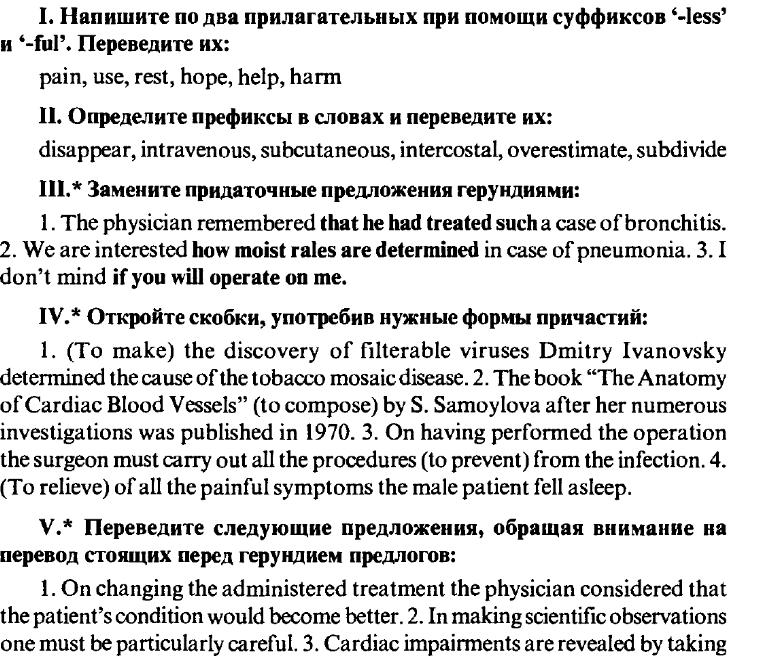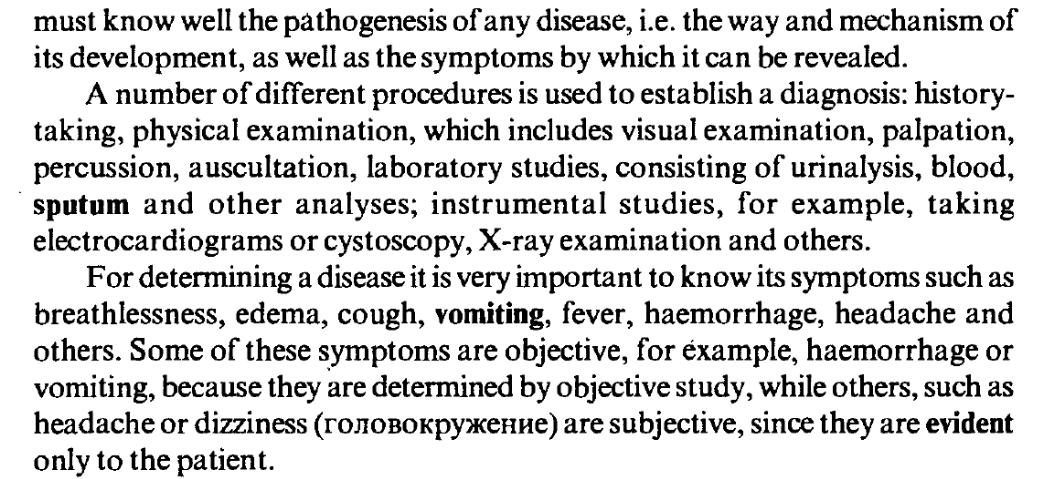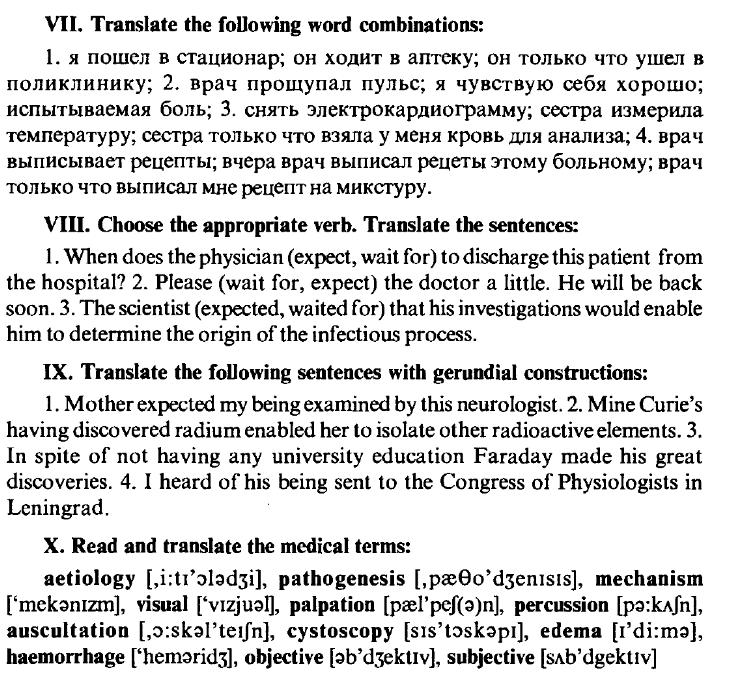
- •Стоматологічний факультет курс і структура залікового кредиту - модуля 1:
- •Інтродуктивний.
- •Active Vocabulary
- •Our classes – наші заняття
- •Active Vocabulary:
- •Pay attention how names of these medical specialists are formed:
- •Odessa state medical university
- •My future profession – професія, яку я обираю
- •Hippocrates - гіппократ
- •Hippocrates.
- •Grammar Past Simple
- •Nikolay ivanovich pirogov
- •In 1840 Pirogov took up an appointment as professor of surgery at the academy of military medicine in Saint Petersburg.
- •Intravenous administration внутрішньовенне призначення
- •Who (world health organization)
- •International officers working in who are stationed … headquarters … Geneva… Regional offices.
- •At the Pharmacy
- •Systems of the body
- •The skeleton - скелет
- •Human body
- •B o n e s , m u s c l e s , j o I n t s - кістки, суглоби, м’язи
- •Bones, muscles, joints.
- •Lesson 18. Tissues
- •C e l l s - клітини
- •E n d o c r I n e g l a n d s – ендокринні залози
- •Endocrine glands
- •Microbiology - мікробіологія
- •Microorganisms
- •Robert Koch – Роберт Кох
- •Can, must, should, could, be able to, might, need, have to
- •Fleming (centre) receiving the Nobel Prize from King Gustaf Vof Sweden (right), 1945
- •In 1942 Fleming tried his own first experiment. A friend of his was very ill, dying. After several injections of penicillin the man was cured. It marked the beginning of penicillin treatment.
- •The Heart - Серце
- •Iron залізо To facilitate сприяти, полегшувати
- •Haemoglobin
- •Minerals - Мінерали
- •The oral cavity - ротова порожнина
- •Anatomy of a tooth - анатомія зуба
- •Sets of teeth - набір зубів
- •Sets of teeth
- •Dental formulas
- •I (to suffer) never from such a horrible headache.
- •Modern Stomatology - Сучасна стоматологія
- •Stomatological polyclinic – стоматологічна поліклініка
- •At the dental surgery
- •Oral hygiene - гігієна ротової порожнини
- •Oral hygiene and the prevention of dental disease
- •Список використаних джерел
At the Pharmacy
A pharmacy (commonly the chemist in Australia, New Zealand and the UK; or drugstore in North America; retail pharmacy in industry terminology; or Apothecary, historically) is the place where most pharmacists practice the profession of pharmacy.
According to Sharif Kaf al-Ghazal, the opening of the first drugstore is recorded by Muslim pharmacists in Baghdad in 754.
At the pharmacy there are two departments: a prescription department and a chemist’s department. At the prescription department medicines are sold or made up according to prescriptions. At the chemist’s department one can buy medicines without prescriptions.
At the pharmacy all medicines are kept in drug cabinets, on the open shelves and in the refrigerator. Every small bottle, a tube or a box has a label with the name of the medicine. There are labels of four colours: green labels indicate medicines for internal use; blue labels indicate drugs for injections, labels of a yellow colour indicate drugs for external application and labels of a pink colour indicates drugs for the treatment of eye diseases. The single dose and the total dosage are indicated on the label.
At the pharmacy one can buy different drugs for intramuscular and intravenous injections, tubes of ointments, different pills and tablets for internal use, tonics and sedatives; drugs for cough and headache; cardiac medicines; herbs and things for medical care (hot-water bottles, medicine droppers, cups, thermometers) and many other things.
Pharmacies are typically required to have a pharmacist on-duty at all times when open. It is also often a requirement that the owner of a pharmacy must be a registered pharmacist, although this is not the case in all jurisdictions.
Likewise, many pharmacies are now rather grocery store-like in their design. In addition to medicines and prescriptions, many now sell a diverse arrangement of additional items such as cosmetics, shampoo, office supplies, confections, snack foods, durable medical equipment, greeting cards, and provide photo processing services.
Exercise 4. Answer the questions.
1. How are pharmacies called in the UK?
2. Who was first to open pharmacies?
3. How many departments are there in a pharmacy?
4. What can you buy at a prescription department?
5. What can you buy at the chemist’s department?
6. Where are all medicines kept?
7. What kind of label do medicines have? What do they mean?
8. Who can work at the pharmacy?
9. Can you buy any food at the pharmacy?
10. What else can you buy at the pharmacy?
Exercise 5. Translate into English.
Купити в аптеці; рецептурний відділ; ліки для внутрьовенних інєкцій; лікування очних хвороб; мусульманські аптекарі; без призначення; за призначенням лікаря; вказують на ліки для внутрішнього застосування; черговий аптекар; додаткові засоби; офісне приладдя; листівки.
Exercise 6. Define synonyms.
1. “disease”: - dizziness - drug - remedy - treatment - illness 2. “drug”: - dizziness - disease - remedy - treatment - illness 3. “to disappear”: - to vanish - to administer - to complain of - to call - to consult
|
4. “sick”: - ill - serious - light - moist - acute 5. “immediate”: - urgent - slow - seldom - usually - always 6. “to improve”: - to become better - to be sick - to precede - to involve - to suffer from
|
7. “to treat”: - to observe - to cure - to return - to be ill - to reduce 8. “to reveal”: - to find out - to involve - to make - to affect - to mark 9. “constant”: - permanent - causative - purulent - rare - frequent
|
10. “clean” - pure - good - bad - soft - hard
|
Exercise 7. Find the meaning of the following words:
1. «sign» - diagnose -symptom - conclusion - location - organ 2. «severe» - light - mild -serious - moist - dry 3. «unit» -department - place - service - ward - room |
4. «fever» - cold - pain - high tº - pressure - blood 5. «correct» -exact - wrong - different - unknown - severe 6. «amount» - form - level - volume -number - organ |
7. «enlargement» -increase - decrease - fall - diminish - admit 8. «reduce» - increase - enlarge -decrease - reveal - cause 9. «contain» -include - exclude - coat - admit - send |
10. « total» - whole - every - each - none - never
|
Exercise 8. Insert the missed words and translate:
There are two departments in the ______ where George went.
At the ________ department one can have some medicines right away.
Other drugs have to be ordered at the __________ department.
At the chemist's they keep all drugs in ____________.
Every small bottle or box has a lable with the name of the _________ stuck on it.
There are labels of three colours: white ones ________ to indicate drugs for internal use; yellow ones are stuck to indicate drugs for external use, and blue ones are stuck to indicate drugs used for injections.
The dose to be taken is usually indicated on a __________ or a lable.
As a rule, the directions for the ___________ of a drug are written on the signature.
It is well known that chemists, nurses, doctors, as well as patients themselves must not _______ different remedies.
Exercise 9. Put questions to underlined words.
1. The opening of the first drugstore is recorded by Muslim pharmacists.
2. At the pharmacy there are two departments.
3. At the chemist’s department one can buy medicines without prescriptions.
4. Every small bottle, a tube or a box has a label with the name of the medicine.
5. Green labels indicate medicines for internal use.
6. Blue labels indicate drugs for injections.
7. Labels of a yellow colour indicate drugs for external application.
8. The single dose and the total dosage are indicated on the label.
9. Pharmacies are typically required to have a pharmacist on-duty.
10. Many pharmacies are now rather grocery store-like in their design.
Exercise 10. Make a dialog “At the Pharmacy” by putting these sentences in the right order. Translate it.
Thank you. How much do I owe you? Yes, please. Can you recommend something for these spots on my arm? Oh dear! They're nasty. I think you should see a doctor. Good morning. I'd like a blister pack of antipyretics, please, Good morning. Can I help you? I can't get an appointment until Monday and they're very itchy. Here you are. Thank you for your help. Goodbye. Three pounds twenty, please. Thank you. Goodbye. Well, try this ointment. That should stop the itching.
Exercise 11. Make up your own dialog on this topic. The customer should ask for a recommendation for the following problems:
Stuffy/runny nose Fever Upset stomach
Sore muscles Headache Insomnia
Diarrhea Constipation Severe Itching
The pharmacist should ask the following:
how long the symptoms have been present if the customer is allergic to any medicines
why they have the symptoms (if known) the severity of the problem
Active vocabulary for this topic:
-
Adhesive plaster – лейкопластир;
Alcohol – спирт;
Ampoule – ампула;
Antibiotics – антибіотики;
Antiemitic drugs – протинудотні ліки;
Anti-inflammatory drugs –протизапальні ліки;
Antipyretic drugs – жарознижуючі ліки;
Antiseptics – антисептики;
Bandage, dressing – бинт;
Blister pack – конвалюта;
Bottle – пляшечка;
Box – коробочка;
Brilliant green – зеленка;
Capsule – капсула;
Cod liver oil – риб’ячий жир;
Contaceptives – протизаплідні;
Cotton, wadding – вата;
Decoction – відвар;
Dosage – дозування;
Dose – доза;
Dragee – драже;
Dropper – крапельниця;
Drops – краплі;
Drug – наркотик;
Elixir – еліксир;
Emulsion – емульсія;
Enema – клізма;
Extract – екстракт;
Gauze – марля;
Gel – гель;
Gloves – рукавички;
Gown – халат;
Herbs – трави;
Hot water bottle – грілка;
Inhaler – ингалятор;
Iodine – йод;
Juice – сік;
Laxatives – проносне;
Liniment – рідка мазь;
Lotion – лосьйон;
Mask – маска;
Medicine, remedy, drug – ліки;
Mixture – мікстура;
Mustard plaster – гірчичник;
Ointment – мазь;
Pain killer – болезаспокійливе;
Pills – пігулки;
Poison – отрута;
Powder – пудра;
To Prescribe – призначати;
Sachet – саше;
Sedative – заспокіливе;
Sleeping pill – снодійне;
Solution – розчин;
Solvent – розчинювач;
Suppository – свічка;
Suspension – суспензія;
Syringe – шприц;
Disposable syringe – одноразовий шприц;
Syrup – сироп;
Tablet – таблетка;
Thermometer – термометр;
Tincture – настійка;
Tonic – тонік;
Tube – тюбик;
Vasoconstrictor – сосудозвужуюче;
Vasodilator – сосудорозширююче;
Vial – флакон;
Vitamins – вітаміни.
Exercise 12. Make up 10 sentences with words from exercise 11.
Exercise 13. These are sentences from real conversations. Put in the question tags.
1. I'm operating tonight, ____________________ ?
2. He's not an infant, ____________________ ?
3. It'll be all right, ____________________ ?
4. Laura's still got minor symptoms, ____________________ ?
5. She doesn't feel well, ____________________ ?
6. They left early, ____________________ ?
7. She didn't feel well yesterday, ____________________ ?
8. They've left early, ____________________ ?
9. Paul is a good doctor, ____________________ ?
10. Beto and Susan are in Princeton-Plainsboro, ____________________ ?
Exercise 14. Find and correct the mistakes in each sentence.
1. You're medical students, aren't they? ___________________________________
2. You aren't English, aren't you? ___________________________________
3. Mary smokes, didn't she? ___________________________________
4. Young patients don't like vegetables, don't they?______________________
5. Blind can't see, can it? ___________________________________
6. You'll be there, won't she? ___________________________________
7. David won't come, has he? ___________________________________
8. Bob's got two operations, isn't he? ___________________________________
9. The treatment isn't very good, has it? ___________________________________
10. All the lessons start at 8.00, doesn't they? _________________________________
Exercise 15. Match the beginning of the sentences and the question tags.
Tag Question Question Tag
1. She needs some medical help, a. was it?
2. They are away for a few weeks, b. won’t you?
3. It's warm, c. doesn't she?
4. It wasn't your turn, d. will you?
5. There is a problem, e. is she?
6. You're not serious, f. aren't they?
7. You come here often, g. isn't there?
8. She isn't Italian, h. isn't it?
9. Don't forget, i. are you?
10. You will give me this drug, j. don't you?
Exercise 16. Imagine questions for such tags:
1. ________________________, isn’t he?
2. ________________________, don’t I?
3. ________________________, does she?
4. ________________________, don’t they?
5. ________________________, don’t we?
6. ________________________, doesn’t she?
7. ________________________, do they?
8. ________________________, don’t I?
9. ________________________, do you?
10. ________________________, does she?
Exercise 17. Give a short summary of the text defining the main problems discussed in the text «At the Pharmacy».
Exercise 18. Fill in the blanks:
1. People are suffering … many diseases.
2. This disease is due … virus.
3. Patient Smirnov was admitted to the ….
4. The patient with pneumonia complained of the pain in the … .
5. George handed in the … for the cough mixture.
6. At the chemist's department George bought some … for headache.
7. … are administered orally in case something is wrong with the patient's stomach because of indigestion.
8. Healing … are rubbed in to relieve pain or skin irritation.
9. Ampoules of glucose and camphor used for … and intramuscular injections.
10. Poisonous drugs are kept in the drug cabinet … with the letter A.
TEST
1. The word drugstore is used in…
the UK Australia New Zealand North America Everywhere
2. According … Sharif Kaf al-Ghazal the opening of the first drugstore is recorded by Muslim pharmacists.
a) by b) of c) to d) from e) on
3. At the pharmacy… medicines are kept in drug cabinets.
a) all b) none c) some d) any e) few
4. First pharmacy was opened in…
a) 705 b) 704 c) 754 d) 54 e) 1754
5. At the pharmacy there are …departments.
a) 1 b) 2 c) 3 d) 4 e) 5
6. At the chemist’s department one can buy medicines…
for headaches only for higher price without prescriptions
with prescription with a passport
7. Green labels indicate medicines … internal use.
Of by at for with
Examination of the patient - Огляд хворого


![]()



S Y S T E M S O F T H E B O D Y
СИСТЕМИ ОРГАНІЗМУ
Exercise 1. Practice the pronunciation:
muscular ['mΛskjulə], circulatory ['sə:kjulətəri], digestive [di'dƷstiv] respiratory [ris'paiərətəri], urinary ['juərinəri], associate [ə'səu∫ieit], blood [blΛd], nitrogenous [nai'trכdƷinəs], urethra[juə'ri:θrə], dioxide [dai'כrsaid]
Exercise 2. Topical vocabulary:
circulatory system - система кровообращения
digestive - пищеварительный
respiratory - дыхательный
reproductive - репродуктивная, связанная с размножением
processing - обработка
nutrients - питательные вещества
waste - продукты распада
to remove - удалять
to discharge - выделять
Exercise 3. Translate the following word combinations:
Reproductory system, digestive system, cellular wastes, spinal cord, all necessary means, blood stream, associated glands, nitrogenous wastes, throughout the body
Exercise 4. Translate into Russian paying attention to the Passive Voice:
The blood is pumped through the blood vessels.
Special substances required by cells are carried by the blood stream.
The urine is stored in the urinary bladder.
A large number of activities is regulated by the endocrine system.
The urine is discharged through the urethra.
Exercise 5. Read and translate the text:
